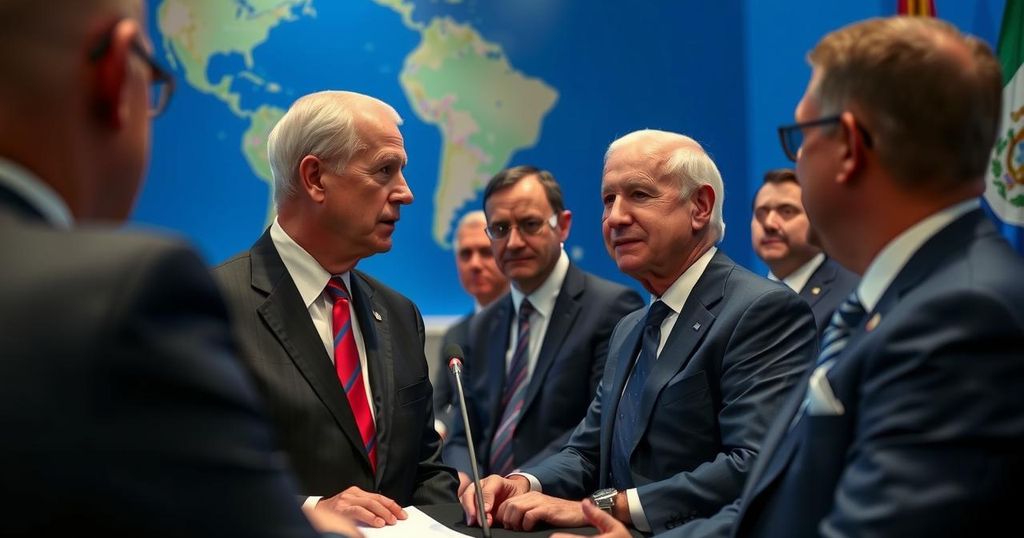President Biden’s six-day trip to Peru and Brazil marks his final major international summits as president. With world leaders focused on the implications of Donald Trump’s return to the White House, discussions will revolve around foreign policy, national security, and cooperation on key global issues. Biden seeks to maintain continuity in U.S. relations and reinforce support for allies during this politically transitional period.
President Joe Biden is embarking on a six-day visit to Peru and Brazil, marking the conclusion of his major international engagements as president. This trip includes participation in the Asia-Pacific Economic Cooperation (APEC) summit in Peru and the Group of 20 (G20) summit in Brazil. World leaders are especially attentive to the implications of Donald Trump’s anticipated presidency, leading to significant discussions about foreign policy and security matters. As Biden engages with global leaders, including a pivotal meeting with Chinese President Xi Jinping, many leaders are reflecting on Trump’s return and its potential impact. White House officials assert that Biden’s agenda will address critical issues such as climate change, global infrastructure, and continued support for Ukraine amidst Russian aggression. Biden’s meetings aim to reaffirm America’s commitment to its allies and tackle pressing international challenges. In addition to discussions on geopolitical tensions and trade issues, there is a shared concern about the political transition in the United States. Analysts contend that Biden’s summits will be significant for providing reassurances to the global community regarding America’s democratic processes. Chinese President Xi’s rising assertiveness in global affairs also dominates the agenda, as does the fallout from increased U.S.-China tensions during Biden’s tenure. Biden is keen to portray stability during this transition and has sought to maintain a relationship with Xi despite existing strains over trade practices and other confrontational incidents. He will also explore critical concerns surrounding cybersecurity, particularly in relation to allegations of Chinese hacking affecting political figures within the U.S. government. This visit is particularly critical as it serves to underline the importance of continuity in foreign relations amid uncertainties raised by Trump’s policies. Overall, Biden’s trip to South America is emblematic of a broader strategy to reinforce alliances while navigating the complexities of impending changes in U.S. leadership. The stakes are high as leaders surround him with scrutiny, eager to understand how the transition will influence global dynamics and bilateral relations in the years to come.
The article discusses President Joe Biden’s upcoming international visit to Peru and Brazil, which will feature participation in significant summits as he approaches the latter part of his presidency. It highlights the concerns of world leaders regarding the expected return of Donald Trump to the presidency, focusing on the implications this might have for global and bilateral relations. Biden’s meetings with key figures such as Xi Jinping are particularly relevant given the geopolitical tensions and trade intricacies involving the United States and China.
In summary, President Biden’s visit to South America encapsulates critical discussions about international relations and foreign policy as his presidency nears its end. The growing attention on Trump’s impending presidency by world leaders underscores the uncertainty regarding future bilateral relations. Biden aims to reassure allies of America’s commitment to global cooperation while navigating significant geopolitical challenges with nations such as China. The upcoming meetings underscore the pressing need for unity in addressing global concerns amid a politically transitional phase. Moving forward, how this political shift affects these relationships remains to be seen, but Biden’s diplomatic efforts may play a crucial role in shaping the trajectory of U.S. foreign policy in the coming years.
Original Source: www.opb.org






